The Future of Visual Manipulation: Dive into the World of Deepfake Apps
Last Updated on October 2, 2023
In a world where technology continues to advance at an astonishing rate, visual manipulation has taken center stage. Enter the era of deepfake apps, where artificial intelligence seamlessly merges the virtual and real worlds. As these apps gain popularity, it’s important to explore the future implications they hold.
With an array of cutting-edge features, deepfake apps offer users the ability to effortlessly swap faces, alter expressions, and even manipulate voices. The result? Astonishingly realistic videos and images that blur the lines between fact and fiction. But what does this mean for the future of visual media and its impact on society?
From entertainment to politics, deepfake apps have the potential to revolutionize the way we consume and perceive information. While they provide a playground for creativity and humor, they also raise ethical concerns and pose serious threats, such as the spread of fake news and the erosion of trust.
Join us as we dive into the mesmerizing world of deepfake apps, exploring the best ones, their capabilities, potential risks, and the importance of responsible use in an ever-evolving landscape of visual manipulation.
How deepfake apps work
Deepfake apps leverage the power of artificial intelligence and machine learning algorithms to manipulate visual media. By analyzing vast amounts of data, these apps are able to generate realistic and convincing videos and images that appear authentic. The process involves training the AI model on a large dataset of real footage, which is then used to create a digital replica of a person’s face. This replica can then be superimposed onto another person’s body, resulting in a seamless and believable deepfake.
While the technology behind deepfake apps is impressive, it also raises concerns about the potential for misuse. With the ability to create highly convincing fake videos, there is a risk of misinformation, identity theft, and even blackmail. It is crucial to understand the capabilities and limitations of these apps to navigate the future of visual manipulation responsibly.
Best Deepfake Apps in The Market
With the increasing demand for deepfake apps, several options have emerged in the market. Let’s take a look at some of the best deepfake apps available:
Synthesia IO– Best Overall
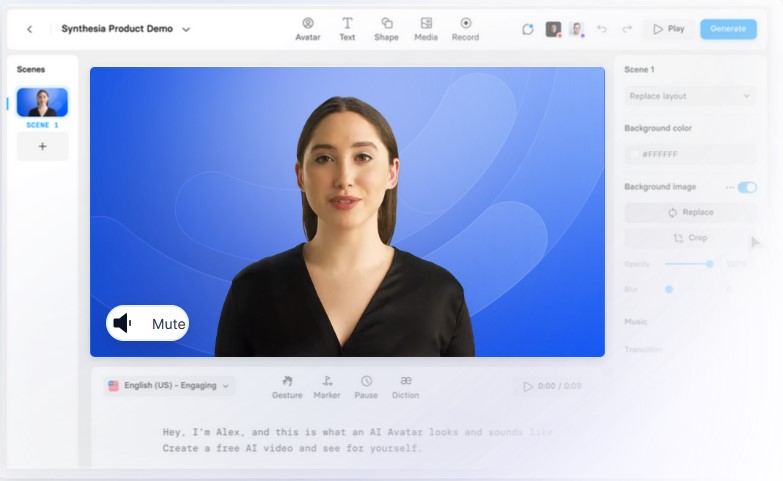
Synthesia.io is a text-to-video platform that uses artificial intelligence to create realistic videos of people speaking. For us it’s currently the top deepfake software. It is easy to use and does not require any video editing or production skills.
Key features:
- Create videos of people speaking in over 60 languages.
- Choose from a variety of avatars, including custom avatars.
- Add text, images, and music to your videos.
- Edit and customize your videos with ease.
- Export your videos in high quality.
Pricing:
Synthesia offers two pricing plans:
- Personal:$22.50/month ($270 billed annually) for 120 minutes of video/year and 10 scenes per video.
- Enterprise: Custom pricing based on your needs
Additional thoughts:
- Synthesia is a great tool for creating training videos, marketing videos, and educational videos.
- It is also a good option for businesses that want to create localized content for different markets.
- Synthesia is still under development, but it has already come a long way. The avatars are becoming more realistic and the videos are looking more professional all the time.
Deepswap
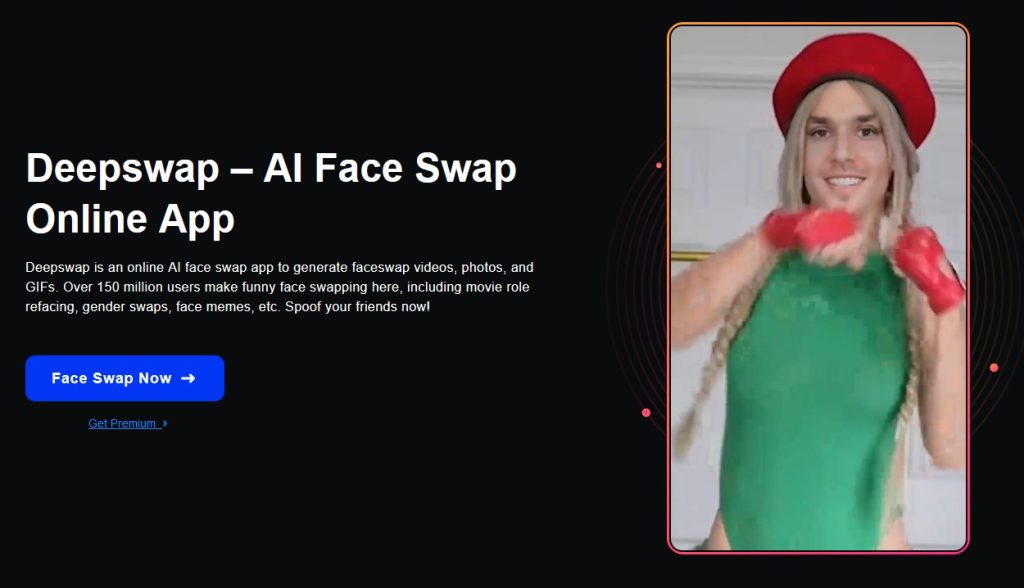
Deepswap is a deepfake app that allows you to swap faces in photos and videos. It offers an AI video generator, AI image generator and GIF maker.
Key features:
- Swap faces in photos and videos with ease.
- Choose from a variety of face templates, including celebrity faces.
- Add text, images, and music to your videos.
- Edit and customize your videos with ease.
- Export your videos in high quality.
Pricing:
Deepswap offers two pricing plans:
- Free: Limited features and watermarks
- Premium: $9.99/month for unlimited features and no watermarks or $49.99 for a whole year.
Additional thoughts:
- Deepswap is a great tool for creating funny videos, pranks, and memes.
- It can also be used to create more serious content, such as social media ads or educational videos.
- Deepswap is still under development, but it has already come a long way. The face swaps are becoming more realistic and the videos are looking more professional all the time.
Reface.ai
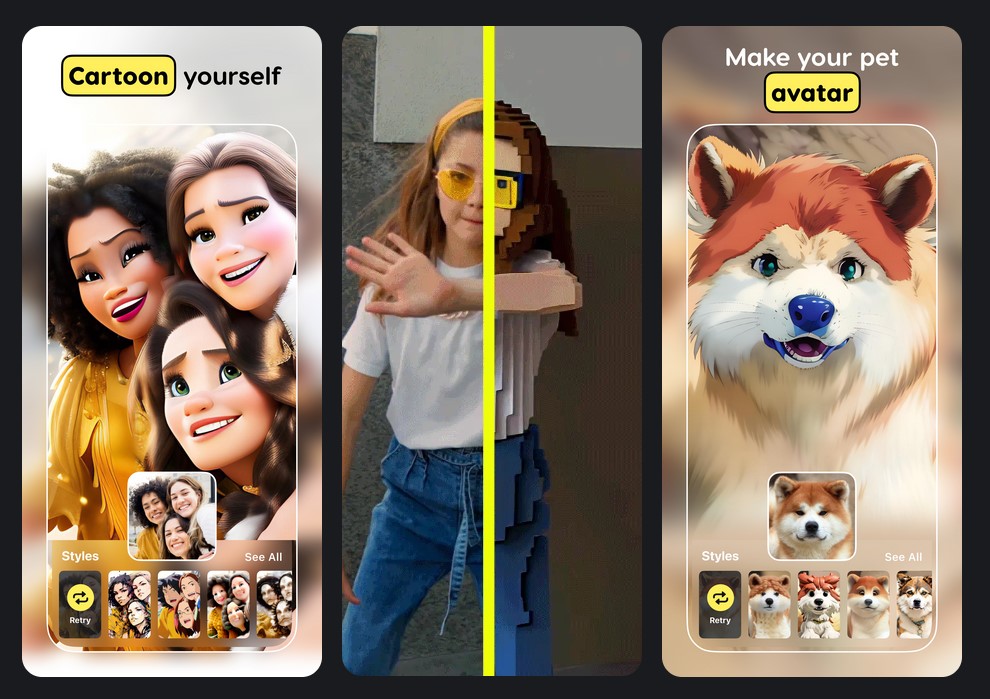
Reface.ai is a face swap app that allows you to swap faces in photos and videos with ease. It uses artificial intelligence to create realistic face swaps, even if the original photo or video is of poor quality.
Key features:
- Swap faces in photos and videos with ease.
- Choose from a variety of face templates, including celebrity faces.
- Add text, images, and music to your videos.
- Edit and customize your videos with ease.
- Export your videos in high quality.
Pricing:
Reface.ai offers two pricing plans:
- Free: Limited features, watermarks and ads.
- Pro: $3.99/month for unlimited features and no watermarks
Overall, Reface.ai is a fun and easy-to-use face swap app that can be used to create realistic face swaps for a variety of purposes.
Additional thoughts:
- Reface.ai is a great tool for creating funny videos, pranks, and memes.
- It can also be used to create more serious content, such as social media ads or educational videos.
- Reface.ai is still under development, but it has already come a long way. The face swaps are becoming more realistic and the videos are looking more professional all the time.
- Reface is available for both Android and IOS.
Lensa AI
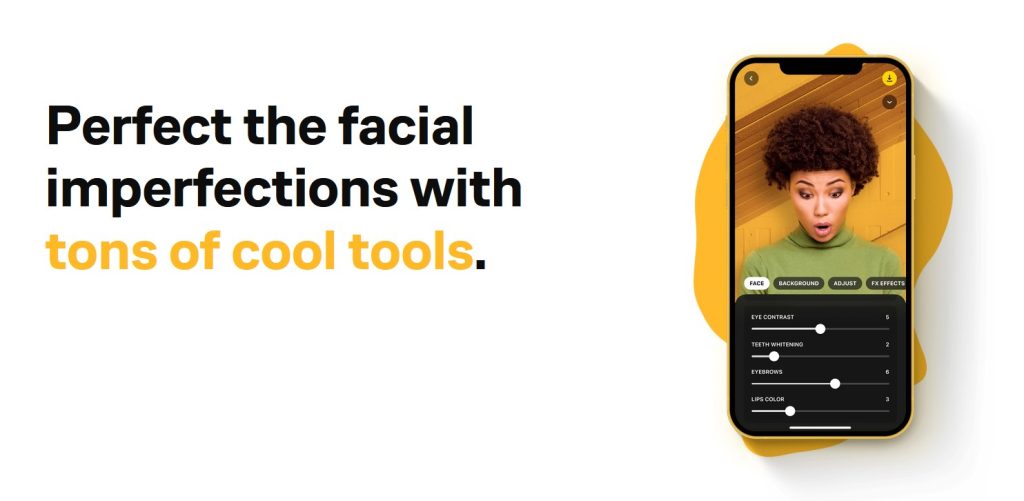
Lensa AI is a mobile app by Prisma labs that uses artificial intelligence to create realistic avatars of people. It can be used to create avatars of yourself, friends, celebrities, you get the idea.
Key features:
- Create realistic avatars of people.
- Choose from a variety of styles and features.
- Unique filters and special effects.
- Easy to use interface.
- Android and IOS versions available.
Pricing:
Lensa AI offers a free version with limited features, as well as a paid subscription for $3.99/month or $19.99/year. The paid subscription gives you access to all of the app’s features, including:
- Unlimited avatar creation
- The ability to save and edit your avatars in high quality
- The ability to remove watermarks from your avatars
FaceApp– Best Selfie Deepfake Editor
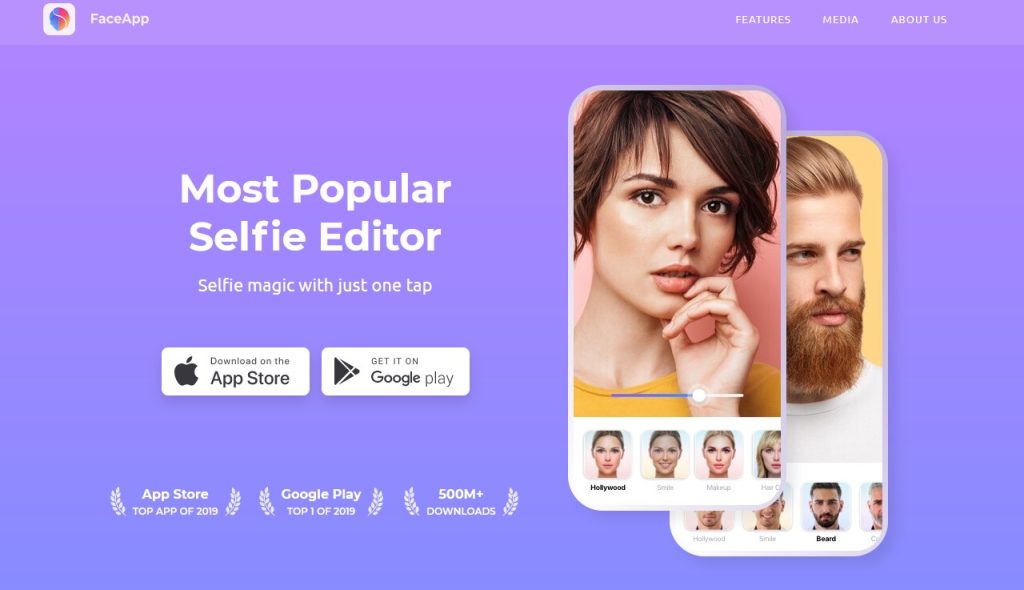
FaceApp is a mobile app that uses artificial intelligence to edit faces in photos and videos. You can make people look younger or older, change their gender, or add other filters and effects. They call themselves “Most Popular Selfie Editor” and they may have a case. They been featured on Forbes ,BBC , Vouge, Buzzfeed and other popular media outlets and been praised for their technology.
Key features:
- Add realistic filters and effects to faces in photos and videos.
- Make people look younger or older, change their gender, or add other features, such as hair, makeup, and accessories.
- Edit photos and videos with ease.
- Available on iOS and Android.
Pricing:
FaceApp offers a free version with limited features, as well as a paid subscription for $3.99/month or $19.99/year. The paid subscription gives you access to all of the app’s features, including:
- Unlimited filters and effects
- The ability to save and edit your photos and videos in high quality
- The ability to remove watermarks from your photos and videos
DeepFaceLab– Developers only
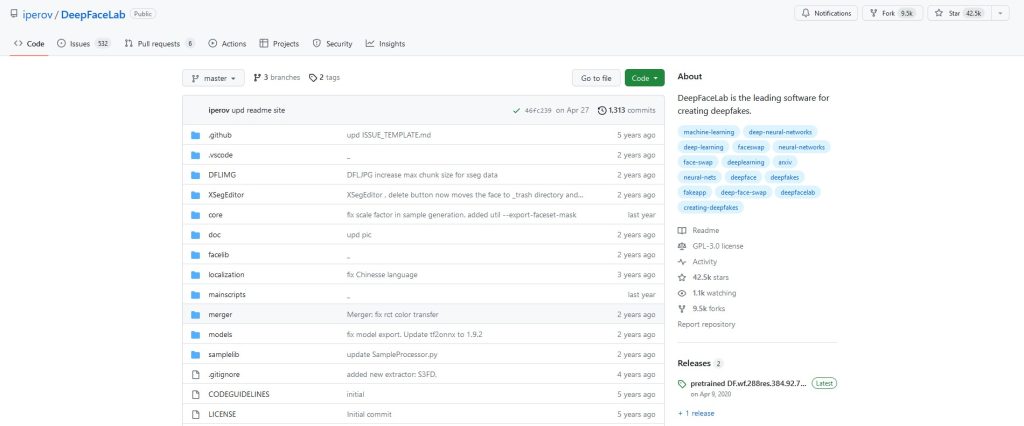
Widely regarded as one of the most powerful deepfake apps, DeepFaceLab offers a range of advanced tools and features. It supports batch processing, allowing users to create multiple deepfakes simultaneously. Additionally, it provides detailed tutorials and documentation to help users navigate the complexities of the app.
DeepFaceLab is a free and open-source deepfake software that allows users to create realistic face swaps in videos. It is more powerful than Reface.ai and Deepswap, but it is also more difficult to use and requires technical skills, so it’s not for everyone.
Key features:
- Swap faces in videos with ease
- Choose from a variety of face templates, including custom avatars
- Add text, images, and music to your videos
- Edit and customize your videos with advanced tools
- Export your videos in high quality
Pricing:
DeepFaceLab is free to use, but it is supported by donations.
Overall, DeepFaceLab is a powerful and versatile deepfake software that can be used to create realistic face swaps for a variety of purposes. However, it is also more difficult to use than other face swap apps.
Zao

Zao is a Chinese mobile app that uses artificial intelligence to create face swaps in videos. It quickly went viral in 2019 due to its ability to create realistic face swaps with celebrities in popular movies and TV shows.
Key features:
- Swap faces in videos with ease
- Choose from a variety of face templates, including celebrity faces
- Add text, images, and music to your videos
- Edit and customize your videos with basic tools
- Share your videos on social media or with friends and family
Pricing:
Zao is free to use, but it offers in-app purchases for additional features, such as the ability to remove watermarks from your videos.
Overall, Zao is a fun and easy-to-use face swap app that can be used to create realistic face swaps for a variety of purposes. However, it is important to note that Zao’s privacy policy gives the company permission to collect and use your personal data, including your face scan.
Deepfake apps in the entertainment industry
The entertainment industry has embraced deepfake technology as a tool for creating engaging and immersive content. Filmmakers and visual effects artists are now able to seamlessly blend real and virtual worlds, opening up a world of possibilities for storytelling. With deepfake apps, actors can be digitally de-aged or transformed into completely different characters, bringing beloved fictional universes to life in new and exciting ways.
However, the use of deepfake technology in the entertainment industry also raises concerns. The line between reality and fiction becomes increasingly blurred, and there is a risk of misleading audiences or creating false narratives. It is crucial for creators to use deepfake apps responsibly, ensuring that they are transparent about the use of deepfake technology and its impact on the final product.

Deepfake apps in politics and media
The rise of deepfake apps has significant implications for politics and media. In an era where information spreads rapidly through social media and news outlets, the manipulation of visual media can have far-reaching consequences. Deepfake videos can be used to discredit political opponents, spread false information, or incite social unrest.
The potential for deepfake technology to undermine trust and democracy cannot be ignored. It is essential for policymakers, journalists, and the general public to be aware of the existence of deepfake apps and take steps to verify the authenticity of visual media. The responsible use of deepfake technology in politics and media is crucial to maintain trust and ensure the integrity of information.
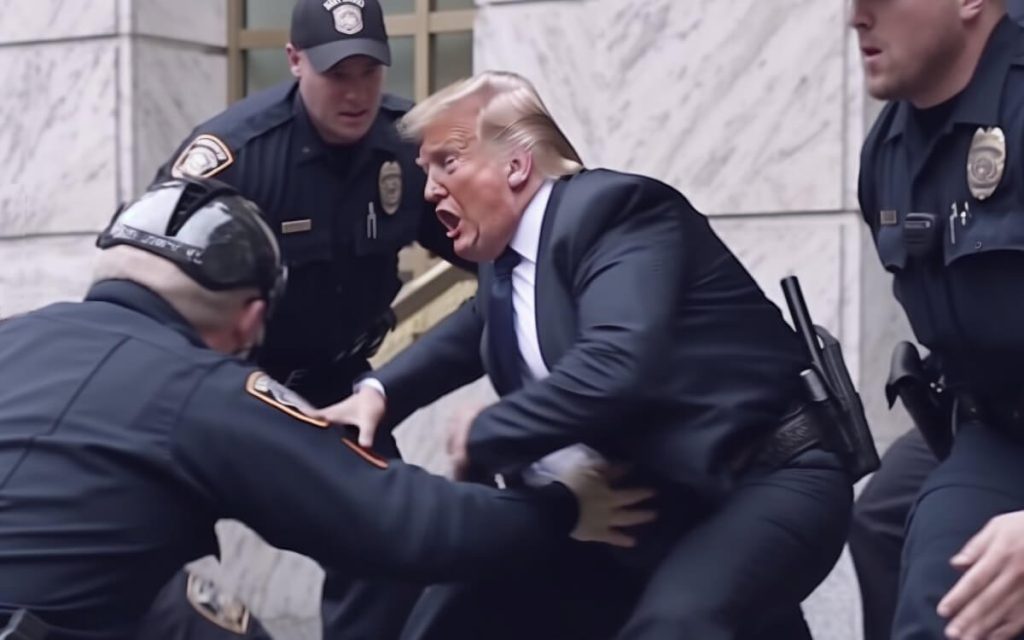
Legal implications of using deepfake apps
The rapid advancement of deepfake technology has left lawmakers grappling with the legal implications surrounding its use. As deepfake apps become more accessible and their capabilities improve, there is a need for clear regulations to prevent misuse and protect individuals’ rights.
One of the key legal concerns is the violation of privacy. Deepfake apps have the potential to create explicit or compromising content without the consent of the individuals involved, leading to severe emotional distress and reputational damage. Laws addressing non-consensual deepfake creation and distribution are being introduced in various jurisdictions to hold perpetrators accountable.
Additionally, there are copyright concerns when deepfake technology is used to manipulate copyrighted material or create unauthorized derivative works. Intellectual property laws need to be updated to address these emerging challenges and strike a balance between artistic expression and protecting creators’ rights.
Ethical concerns surrounding deepfake technology
The ethical implications of deepfake technology are complex and multifaceted. While deepfake apps offer a playground for creativity and entertainment, they also raise significant ethical concerns.
One of the primary concerns is the potential for deepfake technology to be used for malicious purposes. Deepfakes can be weaponized to spread misinformation, defame individuals, or create political unrest. The ability to deceive and manipulate visual media erodes trust and undermines the very foundations of democracy.
Furthermore, deepfake technology raises questions about consent and consent verification. The creation of deepfakes using someone’s likeness without their permission violates their privacy rights and can have serious emotional and psychological consequences.
Deepfake detection techniques
As deepfake technology becomes more sophisticated, the need for reliable detection techniques becomes crucial. Various researchers and technologists are working on developing tools and algorithms to detect deepfakes and differentiate them from authentic media.
One approach is to analyze the subtle artifacts and inconsistencies that deepfake algorithms introduce into videos and images. By leveraging machine learning algorithms, researchers can train models to identify these telltale signs and flag potential deepfakes. However, as deepfake technology advances, so does the sophistication of detection techniques, creating an ongoing cat-and-mouse game between creators and detectors.
One of the leading companies in deepfake detection is sensity.ai
Navigating in a new world of Deepfake Software
As deepfake apps gain popularity and become more accessible, it is essential to approach them with caution and responsibility. While these apps offer exciting opportunities for creativity and entertainment, they also pose significant risks to individuals, society, and democracy as a whole.
By understanding the capabilities and limitations of deepfake technology, we can make informed decisions about its use and ensure that it does not undermine trust or perpetuate harmful narratives. It is crucial for users, creators, policymakers, and technologists to collaborate and establish guidelines and regulations that promote responsible use of deepfake apps.
As we navigate the future of visual manipulation, it is imperative to strike a balance between innovation and accountability. By embracing the potential of deepfake technology while remaining vigilant, we can shape a future where visual media is both captivating and trustworthy.
FAQ
Some of our favoriate ones are:
Synthesia IO
Reface AI
ZAO
In August of 2023 a new law was legislated in Minnesota making it a crime to use deepfakes to influence an election or disseminate nonconsensual sexual pornography. As Deepfake becomes more and more common we are likely to see more similar laws.
Deepfake apps raise a number of ethical questions, including:
Consent: Who owns the rights to a person’s image and likeness, especially after they have died? How can we ensure that people consent to their image being used in a deepfake?
Harm: What are the potential harms of deepfakes? For example, deepfakes could be used to spread disinformation, damage someone’s reputation, or even commit fraud.
Authenticity: How can we distinguish between real and fake media? As deepfake technology becomes more sophisticated, it may become increasingly difficult to tell the difference.
Regulation: How should we regulate deepfakes? For example, should we ban certain types of deepfakes, or require them to be labeled as such?
These are just a few of the ethical questions that we need to consider as deepfake technology continues to develop. It is important to have a public conversation about these issues so that we can develop policies and guidelines that protect people and society.



